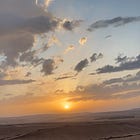Healthy Jew Silence Meditation
Observing our bodies and minds while lying down in the Negev desert in the rain at night.
Dear Healthy Jew,
Last week I shared with you Yeshivat Lev HaTorah’s experience at sunset on the peak of Mount Katom, a lovely little mountain in the Negev Desert.
As darkness descended over the world, we carefully climbed down and spread out over the desert floor.
Dusk turned to pitch-black desert night. The clouds thickened, we felt the first drizzles come and go, then a few minutes of steady rain. Throughout it all, we lied motionless on the desert floor, searching for the sound of silence.
Here’s a full recording of our experience.
Before you listen, please consider these points:
The long moments of silence aren’t breaks in the message - they are the message. If possible, I suggest you sit or lie through them, listening and following along as best as you could. Do it, don’t think it.
Durning this meditation, I discuss several Torah sources, such as God’s call for silence in response to the heavenly protests at Rabbi Akiva’s brutal death. I do not mean to say that our body-centered meditation is the explanation of what happened in that episode, nor do I mean to suggest that these meditations are the pinnacle of spiritual achievement. What I do mean to say is that we can only begin to experience the deepest Torah teachings if we’re intimately aware of the words and concepts they’re talking about. (In our situation, silence and awareness.) This is the barest beginning of the path, not the ultimate goal.
If you’ve experienced mindfulness meditation before, you might recognize many similarities to Jon Kabat Zin’s body scan meditation. The reason is that I indeed learned many of these techniques from his excellent recordings that can be found here. (I hope to expand much more on this in future posts.)
Do you want to learn more about the health benefits - for body and soul - of silence?
Check out this post about our silent walk in last year’s Healthy Jew class, where we headed out to experience the Rambam’s instruction (Hilchos Deos 2) “A person should always do a lot of silence.”
Search for Silence
The Healthy Jews of Lev Hatorah walked up the street in silence, heading out to the dark countryside. We passed Rabbi Shimshon and another student, deep in conversation on a bench, and smiled at them awkwardly as we shuffled by. No words were exchanged.
Thank you for reading Healthy Jew.
Here are 2 great paths to continue the journey:
Also check out this intro and index to explore hundreds of posts about our 3 Healthy Jew topics: Wellness with Wisdom, Land of Life (Israel), and Sensible Spirituality.
Finally, always feel free to reach out here with any comments, questions, or complaints:
I look forward to hearing from you!
Be well,
Rabbi Shmuel Chaim Naiman







